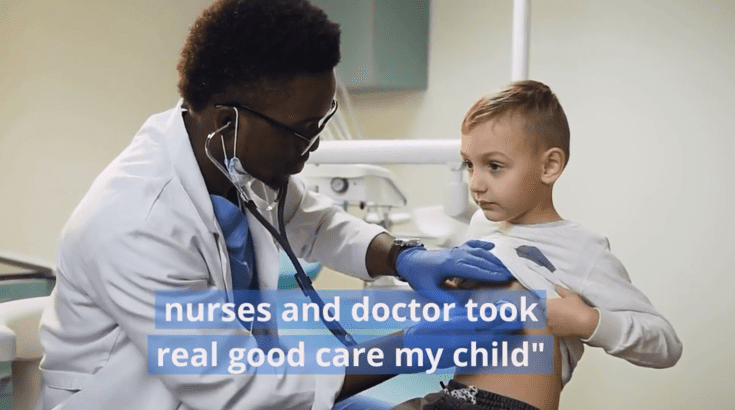When your kid is sick or unlikely incidents happen, you might get caught in a dilemma if you should go to urgent care clinics or the emergency room? Don’t stress! You can be less anxious if you know when it’s a medical emergency or not.
Whether your child’s case is an emergency or not, medical practitioners are aware that you only intend the best for your child. After everything is through, your little brave patient will eventually thrive.
Emergencies and Urgent Care: What’s the Difference?
Non-Emergencies
There are instances when you notice something different with your little one but you’re unsure whether it’s an emergency. All you know is that your child requires medical attention. In these cases, give your pediatrician a call.
They’re like your child’s “medical home”, always ready to take your call, even fixing things over the phone! There are situations that call for immediate attention but aren’t ER-worthy. We’ll tackle these in detail later in this post.
Emergencies

It’s not easy to figure out whether your child needs medical attention immediately, counting as an emergency or otherwise. If your little one can walk and talk normally or even interact with you, then there’s a great chance that they aren’t in immediate danger.
Otherwise, don’t waste time and call 911 immediately. Situations that require emergency care include large wounds with profuse bleeding, fevers in babies under two months old, seizures lasting longer than two minutes, and other worrisome symptoms.
You might be anxious. Just remember that when you’re in any doubt, get help immediately.
Urgent Care Services
- Urgent Care and non-emergency hospital-based acute care
When your child is suffering from a medical condition that isn’t an emergency, but still need immediate attention, go to an urgent care clinic. You often find one that is open even after regular working hours or on the weekend.
You would typically resort to urgent care clinics if it’s beyond the normal clinic hours of your pediatrician. Take note though that the staff aren’t specialists in pediatrics. So if you have a newborn or young child, their expertise may not be well-suited.
- Retail-based clinics (RBCs)
These little clinics are found inside supermarkets, pharmacies, and retail stores. Heading to an RBC is convenient but services are limited. While the staff are trained in family practice, they still lack pediatric training. Also, more likely there’s no physician onsite.

When Should You Opt for Urgent Care?
There are cases when heading to an urgent care facility is a good option. But when? Often, when your child has a medical issue but it isn’t life-threatening.
Bringing your child to an urgent care clinic for treatment is a good idea, as long as they aren’t suffering from a medical emergency. The difference between emergency rooms and urgent care facilities depends on the following:
- The severity of your child’s condition.
Life-threatening ones are best treated in an emergency room since immediate medical attention is given with no questions asked. Otherwise, you can head to urgent care clinics. Moreso if such happens beyond the normal clinic hours of your pediatrician.
- Hours of operation, plus the availability of staff:
You can go to an ER at any hour or any day. ER facilities have the necessary equipment and the medical personnel assigned are experts in emergency care. The best part? Emergency responders have access to specialists too!
On the contrary, urgent care facilities are often staffed with a nurse practitioner and a physician assistant, but some have doctors too. The good part is shorter waiting times. The staff can order basic diagnostics such as X-rays and laboratory tests to help with treatment plans.
Plus, urgent care facilities are typically less expensive than emergency room fees.

How Your Pediatric Doctor Helps in Urgent Situations
You’ll never know when your child gets sick or injured. But when they do, your first ally is your child’s doctor. What if such situations happen outside of their regular clinic hours. Nevertheless, even if their clinic is closed, you may still want to call them.
As much as possible, your pediatrician is always ready to take your call. You’re not bothering them, we promise! Your doctor will give instructions what to do next.
You might wonder about those “urgent care” clinics you see around town. Before you head to these clinics, call your pediatrician first. Your doctor will advise on where you should take your child.
What if your child was seen by another doctor?
It is fine for another doctor to see your child but ensure you provide accurate information about their current condition. Additionally, since you have no record with the doctor currently treating your child, you need to provide all the relevant information during the visit.
Such important information that may be asked include your child’s medical history, past immunizations, and medications currently taking. Also, your family’s medical history may be mentioned. Let the doctor know about your child’s other health conditions, such as asthma.
You can request the clinic to send a summary of the treatment given to your child to your regular pediatrician. In case they don’t provide this service, ask for a copy so you can share with your child’s doctor later.
The Role of a Pediatric Emergency Physician
A pediatric emergency physician is often part of the emergency department. They’re focused on medical care to children with emergencies. Your regular pediatrician gets in touch with them for help when needed. With their assistance, your child will be able to overcome:
- High or persistent fever, severe infections, and difficulty in breathing
- Severe injuries such as fractures, head injuries, burns, falls, injuries due to vehicular accidents, and other similar incidents
- Poisonings and overdoses
- Complications of chronic conditions
- Injuries like cuts or animal bites, as well as sprains and foreign objects stuck in your child’s body
Basically if your little one is in trouble, a pediatric emergency physician can help!
When to Seek Emergency Care for Your Child
Kids get seriously sick with no warning! Not only during sickness but also when facing medical emergency. Reaching out to your pediatrician is NOT always the best route in an emergency. The sooner you call 911 the greater the chance for your little one to get better faster.
Be proactive! Discuss what to do in an emergency with your pediatrician beforehand, or during routine checkups. In this way, you won’t be left anxious when emergencies happen.
It’s An Emergency When:
If your child manifests any of the following, act fast and seek emergency medical attention, mostly via calling the emergency number, 911:
- Loss of consciousness or no response when spoken to
- Unresponsive or responsiveness is decreasing
- Acting strange, confusion, withdrawn, or less alert
- Seizure or stiff neck and fever
- Headache, vomiting, or decreased alertness after a fall or head impact
- Persistent and severe pain or increasing pain anywhere
- Difficulty in breathing or shortness of breath
- Fever along with abnormal ABCs (appearance, breathing, or circulation)
- Vomiting blood or coughing up blood
- Massive blood in stools
- Severe abdominal pain that starts suddenly and refuses to subside
- Large, deep cuts at the head, chest, or abdomen
- Bleeding that doesn’t stop after applying pressure for 5 minutes
- Severe burns on hands, feet, groin, chest, or face
- Severe dehydration showing symptoms such as sunken eyes, lethargy, or not urinating
- Skin areas or lips look blue, purple, or gray
- Sudden spreading of purple or red rashes
- Hot or cold weather injuries like frostbite or heat exhaustion
- Major animal bite
What To Do In Case of an Emergency
While nobody wants these things to happen, you may still be faced with emergencies. Panicking won’t help! Being prepared significantly matters in keeping your child safe. If any of the symptoms of emergency cases manifest, call your child’s pediatrician.
Another way, and generally done, is to head to the nearest hospital for ER treatment. But, when things get serious and your child’s life is in danger, call 911.
Always, stay calm so you will be able to act quickly and call for help. There are instances when you even need to perform CPR while waiting for the emergency service team to arrive. You can enroll in classes to learn about this emergency response.
Have emergency information with your child at all times, especially when you aren’t together. Along with phone numbers, also include a list of medicines your child is taking or if they have allergies. This way, anybody will be able to help them in case of an emergency.
Even if emergency situations are scary, you’ve got this.
Preparing for Urgent Care Visits
- Plan ahead and consider a pediatric emergency room. Know the location and if they have pediatricians or pediatric specialists on staff.
Children’s hospitals have kid-friendly environments that make your child’s stay comfortable, with child life specialists to help ease anxiety and make procedures less scary. - Call your pediatrician first if you can. They can give advice over the phone and inform the ER staff that you’re on your way in case you need to head there.
- Treat your child at home if you can. Over-the-counter fever or pain medicine can make a big difference and make the examination process easier. Just take note of the time and dosage you gave your child.
- Stay calm and let your child know what to expect. Panicking can make your child more anxious, so keep communicating with them and be honest while also being sensitive to their age and the situation. Let them know that everyone is there to help.
- If possible, leave siblings at home. Stay focused on your sick child and you won’t be able to do this if you need to keep an eye on your other children as well.
- Be ready to provide the needed information pertaining to your child’s medical history and list of current medications. These should come in handy in case you’re asked by multiple providers and the ER staff.
- A comfort item can go a long way. For your child to feel a bit comfortable, bring something they are familiar with such as their favorite blanket.
- In the ER, first come, first serve is not practiced. The priority of treatment is based on the severity and nature of the case.
Know Where To Bring Your Child –ER or Urgent Care Service
Nobody likes to be in critical medical incidents, especially when it involves our newborns, babies, and young children alike. As parents, it would be like a scary story if you don’t have prior knowledge of what and how to prepare for such situations.
Pediatricians are champs at taking phone calls at all times and helping you deal with critical problems over the phone. In cases when your child needs to be seen by a doctor, your pediatrician will advise you where to go.
Your child’s health and safety are our top concern, and being prepared for uncalled situations is equally important. We at Omega Pediatrics extend our time to discuss with parents regarding emergency treatment or urgent care for our young patients.
It is important that we are here for you so while we are open up to 9 pm occassionally you may need to use the urgent care. That is when we are not open. All you have to do is call us on 470 485 6342 and we will be able to help, always.


